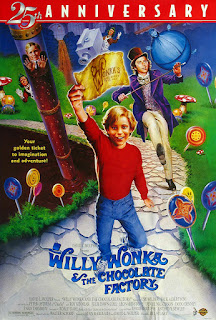Willy Wonka & the Chocolate Factory; fantasy comedy, USA, 1971, D: Mel Stuart, S: Peter Ostrum, Gene Wilder, Jack Albertson, Roy Kinnear, Julie Dawn Cole, Denise Nickerson
Willy Wonka, the most famous candy maker in the world, announces that he hid five tickets to his chocolate factory in chocolate bars. Millions of people frantically buy chocolate bars, yet only five kids find them, including the poor Charlie (12), who lives with his four bedridden grandparents and widowed mother. Charlie brings his grandpa to the factory tour, led by Wonka and his dwarf employees, the Oompa-Loompas. The other four egoistical kids get eliminated: Augustus falls into the chocolate river and gets sucked up in a pipe; Violet eats too much candy and inflates like a balloon; Veruca wants to have the golden eggs of geese in a barn, climbs up on a scale and falls down through the trap door; TV fanatic Mike wants to be teleported by a ray into a TV set, but just exits the screen as small as two inches. Charlie returns a special new candy back to Wonka, refusing to take it home, and thus Wonka declares him the winner of the contest, and his heir to the factory.
One of the most famous live action adaptations of Roald Dahl's novels and one of the most unusual roles of comedian Gene Wilder in one, this peculiar comedy cleverly evades traps of children's movies to offer a universally fun film—minus an ocassional lukewarm musical sequence—though it does stray a little bit too much towards black comedy in the second half. The first half is wonderfully funny and irresistibly charming, offering some deliciously burlesque jokes—in one, after the whole world is in frenzy to try to find the golden ticket in Wonka's chocolate bars, the film presents the case of the spoiled girl Veruca whose rich father bought 750,000 bars and ordered all his employees in the factory to check for as many as possible to find one. When a TV reporter announces that a girl, Violet, found a ticket, he begins to interview her father, but the girl just grabs the microphone and redirects it towards herself, saying: "Dad, they don't want you!", and then goes on to boast about her achievement for the camera. The highlight is one gem of a joke worthy of the Monty Python's, in which a patient is lying on the couch and having this exchange with his psychiatrist: "I dreamed the Archangel appeared and whispered into my ear where to find the golden ticket!" - "And what exactly did he say?" - "What difference does that make? It was just a dream..." - "Shut up and tell me where the ticket is!" However, the second half is weaker and questionable, since its surreal-bizarre ideas sometimes overshadow the story (and its quality). The message that all the selfish, spoiled kids are punished, while Charlie's good heart leads him to victory is wonderful, yet the former is presented through weird ideas, the dumbest being how the kid Mike is shrunk to be transported to a TV screen. Due to such uneven junction of the two parts, "Willy Wonka and the Chocolate Factory" is uneven, yet it has its own kind of logic which assured it cult status.
Grade:++





No comments:
Post a Comment